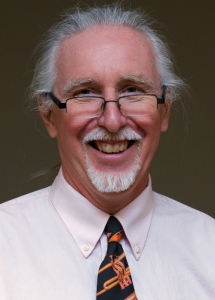 By Bob Hulteen, Director of Communications, Stewardship, and Organizing
By Bob Hulteen, Director of Communications, Stewardship, and Organizing
I had always “prided” myself on not having traveled internationally. While all my friends were headed to other countries for service or learning or vacation, I bragged that I didn’t have a passport. (Though I might have actually been jealous, I used it as an opportunity to demonstrate my identification with people without the means to travel.)
But Tina Herpe, one of my colleagues at Interfaith Worker Justice, told me she didn’t feel the luxury of not having a passport. As a Jew, she believed that there was no country absolutely safe for her, no place where she didn’t need to be ready to relocate quickly.
I figured she was wrong about the U.S. I mean, I was well aware of the anti-Semitic skinheads who would occasionally show up at a city hall or state capitol complaining about how their America was changing. But, to be honest, deep in my soul, I didn’t believe they were a significant threat.
I underestimated the stamina of hate groups.
ON FEBRUARY 22, 1349, Jews were expelled from Zurich, Switzerland. A few days earlier, they were kicked out of Burgsordf, and a month later nearly 1,000 Jews were killed in riots in Efurt, Germany, not the last date of mass execution in that country that year.
That was a long time ago – almost 700 years.
But this week the Saint Paul Jewish Community Center was one of 10 similar centers in the country that received bomb threats. A month or so ago about 70 similar threats were delivered to JCC offices around the country, including Minneapolis.
“I underestimated the stamina of hate groups.”
That is not a long time ago.

Click image for video of members of Trinity Lutheran Congregation handing out tea to their immigrant neighbors after Friday prayers.
This follows upon increasing pressure at masjids where our Muslims sisters and brothers offer prayer. What is the Christian community doing about this?
While it is heartening to see Muslim groups offering rewards for information on anyone phoning in threats or going to cemeteries to clean up after 100 headstones are pushed over, we need a more proactive strategy to declare inviolate our unity in the One Who Creates (for Christians, the First Person of the Trinity).
The Rev. Jane Buckley-Farlee, Trinity Congregation in the Cedar-Riverside neighborhood of Minneapolis, has developed deep and lasting relationships with imams in the community, one of the most densely populated Muslim neighborhoods in the country. She was present when a mosque burned a decade ago. She invited people into her offices on the anniversaries of 9/11. And now, with fear spreading amidst the Somali community due to the uncertainties created by the recent immigration executive orders, she and members of her congregation are greeting Muslims with tea as they come out of their Friday afternoon prayers.
That sounds a lot like something Jesus would do.
We know who are neighbors are; about that there is no question. So, the moral question set before us in this time is how we will be neighbors. Will we commit to protect these neighbors in the face of increased threats? By our fruit will these neighbors know us.
